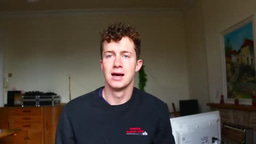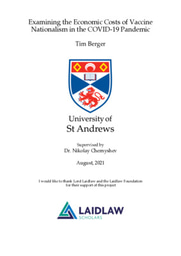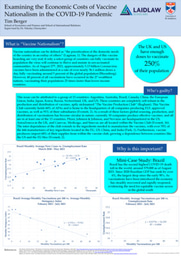
Introduction:
To me, leadership development has never been a favorite subject. I never really understood the purposes of leadership trainings, courses, books, or those inspirational LinkedIn posts that clog your timeline every time a fintech startup does anything. Hard skills, like those picked up working in the service industry or anything that involved quick rapid-fire communication, were my leadership training courses. Or so I thought.
While getting yelled at in a bar, rushing to make the 7 am open sourdough batch at a bakery, or dealing with a caffeine-fueled mildly infuriated middle-aged middle of mid-life crisis customer can teach you quite a lot about people management, a few things go missing. My Laidlaw experience was where I discovered these other areas of leadership, the people part. While organization, speaking with purpose, or standing your ground may be something you can learn in a pub or on a football field, there are certain things you cannot.
My cohort’s final rounds of interviews took place during peak COVID; I had been stuck in St. Andrews since June, interacting almost exclusively with the same 10 people. Even my tutors, responsible for giving us that much needed student-to-student interaction in tutorials had slowly given up hope; losing enthusiasm with each coming week. Committees and sports teams, usually the source of a welcome break from academic monotony, began to slowly lose motivation as we questioned when we would be able to do any of the things, we sank so much time into planning. When I was then asked during my Laidlaw interview what my leadership goal was, I thought for a second and said that I wanted to be “more understanding”. During COVID I realized that now there were things affecting my teammates completely out of my control and moreover, far more important than work. This set the tone for my leadership journey over the course of the scholarship, leading me to focus on elements of leadership more social than organizational in respect to both how I interact with others, and handle myself. Over the course of the past two years, I picked up three key skills: Emotional intelligence, learning when to be silent, and stepping up during discomfort.
Emotional intelligence:
I define emotional intelligence as the ability to read others; your sense of their likes, strengths, motivations, and vice-versa. Each phase of Laidlaw brought along a new phase of learning about these elements of emotional intelligence. The first year of Laidlaw meetings introduced me to my first couple lessons in this area, especially during the first wave of teams-meetings. As interviews were completely remote, we were all scattered throughout the world, each dealing with different realities of the pandemic. In these meetings I learned about leading through understanding these situations; knowing that some may not be able to fully engage due to sharing spaces with family, difficulty interacting online, or other elements. Through this I saw a leader must appreciate and account of the varying situations their teammates may find themselves in to fully utilize their contributions.
Our first summer of research expanded on the challenges and lessons I had become aware of during the winter and spring, with remote project work exacerbating most of them. With the regular leadership workshops and speakers, I saw how others, especially the program heads, were adapting to these issues. Asking to be messaged privately in case one could not use a webcam, using breakout rooms, and more. This showed me how experienced leaders adapt to situations by figuring out mechanisms to gauge the feelings and attitudes of their peers. Similarly, working with my supervisor who was stranded in St. Andrews I had to be able to read his stress levels, especially when COVID surged in the summer. While these observations may seem trivial or obvious, they helped me recognize the importance of being in-tune with the situations of my peers.
These situations manifested themselves in different ways when I landed in Dakar, Senegal for my second summer project with the World Vision charity. Being the only scholar on location in addition to my limited French skills, I navigated most interactions solo. Emotional intelligence became important as I was exposed to large cultural differences, a variety of different scenarios, and numerous political issues. Through trial and error, I learned to observe my peers, specifically how they handled others in both conversation and action. For example, in many of the rural villages I included in my study in Kaffrine the dynamics between World Vision staff and locals was very different to a typical business interaction. In my conversations with locals for my case study and subsequent work with the on-site teams I had to adjust what topics stuck and which did not. On a local level I had to play to some of the regional leaders’ interests; posing for pictures, showing off my graphs, or complementing their efforts within the program so far helped me gather the information I needed and motivate the changes I wanted to see. In this scenario emotional intelligence meant having the situational awareness to listen and collaborate in the right moments.
Learning when to be silent:
One of the most challenging things I have learned throughout my leadership development was, in fact, silence. I am an extroverted person. In other words, often the first person to talk in a silent elevator. However, no matter how useful that may be in certain scenarios it has its shortfalls. During the COVID-year of Laidlaw I learned this the hard way, often talking far too much in leadership trainings or team meetings, making it challenging for others to equally voice their opinions. After one or two sessions, with some gentle suggestions from my peers, I realized that sometimes it is worth it to be silent. A key part of leadership is letting others feel heard and valued in a team, which was doubly important when many were isolated or working from away from St. Andrews. Asking an open-ended question and then just listening can help others get their voice out there, as well as helping bring to the surface ideas that may not have otherwise been noticed.
Throughout the second year of Laidlaw, as we got together for our first couple in-person events, this lesson applied more and more. While in a virtual meeting room everyone voice is just as loud as every other, an in-person meeting leaves allows some to have more of a presence in a room than others. Several of my fellow Laidlaw scholars and I saw that we needed to adjust to this, specifically in group discussions. Just like the virtual discussion rooms we had to create space for others to talk, as well as letting them have it. Reflecting on this I think it is one of the most valuable leadership skills many people don’t talk enough about, which I also saw my managers doing later in the summer during an internship. Being silent and asking questions to allow others to talk lets leaders make others not only feel heard, but also feel appreciated for their ideas. A team is only as good as the contributions of the teammates, so by creating an environment in which others feel heard you allow others to have the space to explore their ideas freely without having to struggle to speak out.
While in Senegal in my second Laidlaw summer this second lesson took on a different meaning: knowing when you have reached the limit of your skills. I often try to get myself out there as much as possible, trying something out even if I know I may not immediately be the best at it. In some of the meetings I was part of for my consulting project I realized that some of the work going on in the room was beyond my expertise, which meant it was far better to just sit back and watch than try to engage. Observing how some of the subsidy deals were structured taught me much more than trying to involve myself directly. I saw how important custom was in some of the World Vision subsidies; respecting local traditions, proper handshakes, or consulting with religious leaders was important to earning the respect of the governing officials needed to sign-off on a deal. When engaging with village WASH teams (Local leaders responsible for implementing snatiation programs) observing how World Vision staff made sure to introduce themselves properly to every part of the community showed me how this groundwork was essential for project sustainability. Engaging where I could, but then taking a step back when I couldn’t, let me see aspects of WASH work I would have not otherwise noticed in such detail. No matter how proactive one is, I learned it can help to take a step back and learn through silence and observation.
Stepping up:
Perhaps the most valuable leadership lesson I have taken from the scholarship in these past 2 years is advocating for myself even in uncomfortable moments. To me leadership means being willing to share your experience and expertise even when it puts you in an uncomfortable situation. Leadership is when one is not afraid to put an idea out there in front of your peers, even when at the end of the day it may not be used. This skill first became apparent to me during the summer of zoom socials and leadership trainings. There was no real precedent to how to run one of these meetings, as no one had ever needed to have teams meeting in university so far. This required some stepping up, breaking that awkward zoom silence. While not necessarily the most comfortable experience it was necessary to get conversations going. Cracking some jokes, asking how people were doing, or even starting some discussion on the day’s topic helped break the ice. While this lesson may just be applicable to online interactions, it taught me that even in uncomfortable situations a leader steps up and tries to create a comfortable environment for everyone. I noticed many of my peers doing the same thing, often engaging with everyone even after we finished our work in breakout rooms, ensuring there wouldn’t be a prolonged silence as we waited to rejoin the main group.
Throughout my LIA project in Senegal the importance of stepping up in leadership scenarios became more apparent to me. As a foreigner who did not speak French, nor had much experience in western Africa, I was at a disadvantage when it came to meetings and business interactions within World Vision. For the first week of my project, I was silent, often choosing to ask questions to my mentor after a meeting instead of engaging during it. This was because I felt like I would be stepping on someone’s toes by adding to a conversation with another perspective. After casually discussing this with my mentor he told me that I need to remember that the reason I am here in the first place is to add my perspective so I can improve their programs, even when some of my comments may end up critical. I took this to heart, participating in whichever way I could over the rest of the program. I realized that while I was an undergraduate, I still had valuable insight to provide to World Vision staff, maybe pointing out parts of their processes that they had not investigated before. For example, in of the villages I was allowed to visit in Fatick I saw how the governor was more concerned with keeping his constituents happy than getting into the details of the WASH program with staff. This is especially important because Senegal has had issues with civil service appointments being done as favors, rather than through qualifications. While this not as much of an issue now I made sure to point it out to my co-workers when we discussed how to proceed with the WASH project. The governor’s interaction with the project was therefore key to starting any sort of social contagion to get others to engage with the WASH program, as he controlled a lot of interests in the town including many of the municipal services needed to complete the project. This situation showed me that while it may be uncomfortable to add a perspective like that, especially when it critiques local government, it helps the project move forward as a whole.
Conclusion:
Over the course of my Laidlaw program, I learned how important leadership development can really be, especially when it comes out of situations you would not otherwise expect to draw these lessons from. From COVID meetings to in-person trainings to 7-weeks abroad, I picked up a variety of new lessons in leadership. Emotional intelligence, learning when to be silent, and stepping up were one of many I developed throughout my time in the scholarship. While my time in the scholarship may be ending, I have already begun to apply much of the work and lessons I learned throughout the program to my future career. I look forward to continuing to engage with the network and the resources that have helped me over the past two years.





Please sign in
If you are a registered user on Laidlaw Scholars Network, please sign in